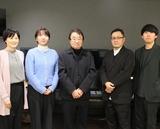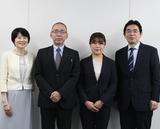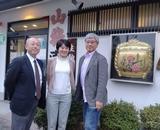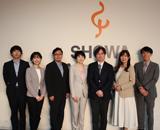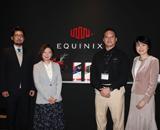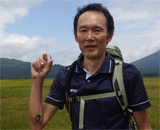February 2013
Conversation with a Professional Translator of Business Books
In this issue, the interview features Yuko Aruga, the ever-so-in-demand translator of business books who has translated over sixty volumes in her field of expertise. Arc Communications' relationship with Ms. Aruga goes back to when in her thirties and just starting out as a freelance translator, we assigned Ms. Aruga to her first translation project. Arc CEO & President Mariko Ohsato, who has since maintained a professional and personal relationship of mutual trust with Ms. Aruga, hosted this interview with a focus on topics such as the important factors for handling business translations and the attitude that should be adopted by professional translators.
- Profile
- Yuko Aruga: Translator
Born in Tokyo. Graduated from The University of Tokyo Faculty of Law. Obtained MBA at London Business School. Started work as a freelance translator in 1998. Specializes in published translation. (See the "Diamond Harvard Business Review") - Mariko Ohsato: CEO & President, Arc Communications Inc.
Translators are Expected to Apply Themselves to Meeting Their Customers' Needs
Ohsato: Yuko, you quit your job at a major telecommunications company to become a freelance translator. That must have been quite a decision to make!
Aruga: I tried working as a company employee for a while, but I simply couldn't see myself continuing like that forever. Job rotations took place at my company, which meant that you had to be involved in a different job every two to three years. The thing is, I felt that I couldn't give my best that way. Instead of being placed in a position where I had to do my best at every kind of job that I was assigned to, I wanted to do give my all to those jobs that motivated me. The other thing was that I felt I was more suited to working hard on my own and at my own pace as opposed to within a large structure.
Ohsato: Didn't anybody at your company try to stop you? Come to think of it, I tell people myself that only a small fraction of linguists can make a living as a published translator. (Laughs)
Aruga: The telecommunications industry was thriving in 1998, so, yes, everyone around me warned me strongly against going through with such a life-changing decision. After all, I was about to throw myself into completely untested waters.
Ohsato: That was around the time that IDS, the company we spun off of, was launched. We were looking into ways of starting our own translation business.
Aruga: A friend introduced us, and I got my first project as a translator from you. Looking back, I think that it was excellent timing since we were both just starting off in a new field.
Ohsato: Yes, we had many meetings late into the night, didn't we? (Laughs)
Aruga: Indeed, we did. Although there is still a lot of enthusiasm and solidarity at Arc today, the kind that existed back then was of yet another kind. You have since become a very valuable confidant to turn to at moments of doubt about my work. I think it's because we share those experiences from when we were first starting out in the translation industry. It also helps that our personalities are so different. Just the other day, a single phone call to you ? one in which you offered an opinion that I would never have thought of on my own ? helped me find my way out of a maze.
Ohsato: You're now one of the leading figures in business book translation and have tackled a plethora of published translations, including your work for Diamond's Harvard Business Review. How many books of your translations have been published?
Aruga: My first published translation was in 2000. It was Diamond's "All the Right Moves: ? A Guide to Crafting Breakthrough Strategy" (Constantinos C. Markides). Before I knew it, I had published over sixty volumes.
Ohsato: That's quite an impressive figure! Did you specialize in business books from the start?
Aruga: Considering my background in telecommunications, I had many IT-related projects in the beginning. As I recall, many of my first translations for Arc were in that particular field too. Later, by chance and through encounters with clients, projects in the business field started growing more numerous.
Ohsato: What, in your opinion, is the most important thing for a translator to keep in mind?
Aruga: First of all, you need to know your client. You need to have a thorough understanding of what kind of a company it is and what they are looking for in a translation. Next, you have to make sure that you have a full grasp of the intended purpose and targeted readership of the document being translated. You can't produce a good translation without these pieces of information. You then have to examine the source document and estimate how much time will be required to output quality work. Even if projects are in the same field and have the same volume for translation, the time required to complete a task may vary greatly between projects. You need to take into account factors such as the idiosyncrasies of the writing style, the amount of research involved and the level of specialized terminology used. It is important not to be lax when making an initial examination of the text, because if you are, you may not be able to meet the promised deadline and cause problems to the client.
Ohsato: Yes, in our business we owe everything to clients. While what you say may seem obvious, the truth is that there may actually be surprisingly few translators who take these elements into account.
Aruga: In my opinion, a translator's work is like that of a craftsman. I recently read the following sentence regarding craftsmanship: "The secret lies in one's ability to repeat an activity that can appear [to others as] monotonous and dull." I thought it really made sense. A translator's workday is mostly spent focusing in front of a computer screen and typing translations. This is repeated day in and day out. What I consider to be crucial is to find a way to avoid being trapped into a tedious routine while always aiming to achieve a certain level of quality. Clients won't trust you if the quality of your output varies from one project to another.
Ohsato: By definition, don't people usually have their ups and downs? (Laughs)
Aruga: We're not machines so, of course, our output can sometimes be of a lesser quality. For example, I don't do well in hot weather, so the Japanese summer can be hellish for me. What I'm saying is that we have to overcome these kinds of problems and do our best to produce consistent quality in our output.
Ohsato: Oh, I see. You mean that that quality of the output shouldn't vary. Indeed, we can always expect high-quality work from you!
Feature Interview Index

